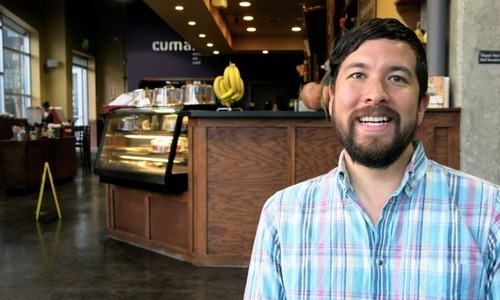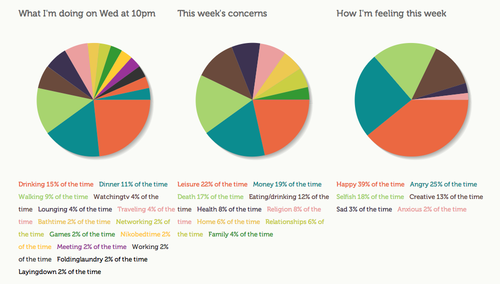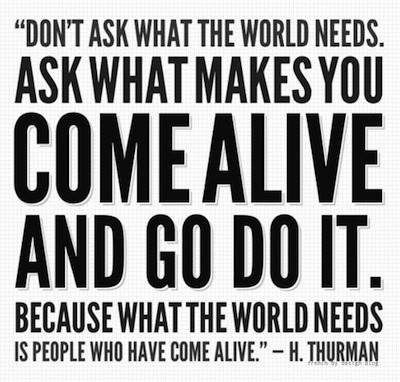Date: Tuesday, October 29
Location: Cafe Cumaica, San Francisco, CA

I found Buster in 2011 when I came across a site he built, 750words.com.
The site, inspired by an exercise in The Artist’s Way, unsurprisingly, encourages people to write 750 words everyday. It’s not blogging. It’s a private place to store unfiltered, spontaneous, thoughts online. The intention is to create a habit of writing three pages (approximately 750 words) daily to clear your mind and get the ideas flowing for the rest of the day.
As Buster says on the site, you can’t get to 750 words “without running into your subconscious a little bit… 750 words takes a bit of effort, and it never fails to get me typing things that I have wanted to articulate without realizing it. And that’s the point”. It’s an exercise that helps you figure out what you’re subconsciously thinking.
The first time I tried it, I was 180 words into my first post I realized, this is hard. I’d run through the typical things, yesterday I did a, b and c. Today I’m doing to x, y, and z. I couldn’t think of anything else to say.
Writing more required going deeper into my psyche.
The process taught me how hard the brain works to avoid deep thoughts. It’s scary to venture into the darker spots in the sub-conscious that are often buried under layers of shallow, safe, things like to-do lists, sports scores and weather forecasts. As a 22 year old, I was so focused on what I wanted to become I was afraid to look closely at the person I already was—what if I didn’t like what I found?
But I stuck with the exercise and over time grew more comfortable with my thoughts. I also got to know Buster better.
Or at least the online version of Buster. The 750words FAQ page led me to Buster’s personal site and various social media channels. I was instantly intrigued—he was so transparent online.

I found his online presence was honest, self-aware and unapologetic: this is who I am, this is what I believe, this is who I love and this is what I do.
It’s rare to find that online, which is why I wanted to meet Buster.
I emailed him and a week later we were sitting at Cafe Cumaica, two blocks from the Twitter office where he’s worked for the past year after moving with his wife and son from Seattle.
Meeting him was exactly what I expected it to be. As a deep thinker myself, I greatly enjoyed our conversation about 750words, life, work, and what it all means in the big picture.
Buster said he made 750words because he likes to tinker, build, experiment, and find ways to be a better human. He wanted a safe place to store his thoughts online and knew others would too so he built it with others in mind and has watched it grow organically.
750words wasn’t his Buster’s first attempt at self-improvement. He’s interested in the quantified self and often looking ways to learn more about himself and the world. Our conversation, which was both fascinating and honest, revealed that Buster’s continuous tinkering, learning, and self-reflection has helped him discover who he is and, more importantly, he seems satisfied with what he’s found.
A self-proclaimed over sharer, Buster has a very public life. His ideas and stories live in all corners of the internet—the obvious places like Twitter and Instagram to more unique places like Medium and LiveJournal (where his online life began). His contributions to the online world are a balanced mix of current events, general musings, and photos of his wife and adorable son Niko—not to mention his fascinatingly boring (his word not mine) goal to take a picture every night at 8:36.
I told Buster I was impressed by his openness—it takes a lot of confidence to show the world who you are. His response was that he had insecurities like everyone else but, despite that, thought privacy was overrated.
To me, that was Buster saying, This is who I am, why hide it?
When he was younger and living in Seattle, he had several groups of friends and a slightly different identity in each group. Keeping the different stories and identities separated started to wear him down so he hosted a “Worlds Collide” party where all his friends could meet. The party didn’t cause his life to implode and afterward he decided to be the same, authentic, Buster wherever he went.
That’s what he is doing today. Buster online is like Buster offline. Who he is at work is who he is at home and out with friends.
…
When meeting someone that seems to have a sturdy grasp on the world and where they fit into it (or at least a better grasp than yourself) it feels right to ask them the questions that keep you up at night.
I confessed to Buster a thought that’s been holding me back for awhile,
"I worry I’m not creating enough value".
Is what I want to do enough? Should I be doing something better?
Buster said he used to think about that a lot too, he used to worry about creating something meaningful for the world. But creating value is such a nebulous thing: what is valuable? Does it count if you help someone else create value? What if you create a lot of value but no one knows you were the driving force? Or what if you never fully understand the value you create?
He said people try to save the world, but to some extent that’s an insecure desire. You want to create meaning for the world to prove to others that your life was meaningful; that you deserved to be here.
Yet the reality is that just being born gives you a right to be here.
Alternatively, if you knew who you were and you loved that person, you wouldn’t be so concerned with doing something to get others to love you; to remember you. Then time spent worrying about creating value could be invested in more productive things like learning, practicing, enjoying the people around you, etc (which would quite possibly lead to a greater impact anyway).
That will stick with me for a long time.
Discover who you are and what you love, then spend your life investing in yourself and the things you care about.
You can spend your whole life chasing meaning and value but ultimately in this chaotic and unpredictable world the majority of what happens in life is far beyond your control and, from Buster’s perspective, often depends on luck.
If you can shift your focus to creating the best version of yourself —instead of meaning for an uncertain world—odds are high that you’ll live a good life and likely create something that makes the world a bit better in the process.
Which goes back to me in 2011, struggling to write 750words because I was afraid to be authentic, because I felt pressure to be something to someone else. Just like Buster said, I had to prove my worth so I was searching to create external meaning.
I still use 750words frequently. The difference is that for the most part 750 words is easy to hit. I’m growing more and more comfortable accepting the real me—from the wonderful and fantastic parts to the flawed and unsavory ones that I formerly worked so hard to avoid.
It’s tough work to figure out who you are, what you believe, who you love, and what you do.
But if you have the courage to figure it out, you’ll live an authentic life. That, as my conversation with Buster revealed, seems like the best way to live.
…
Thanks to @jeannineyeah (officially my unofficial editor)!
